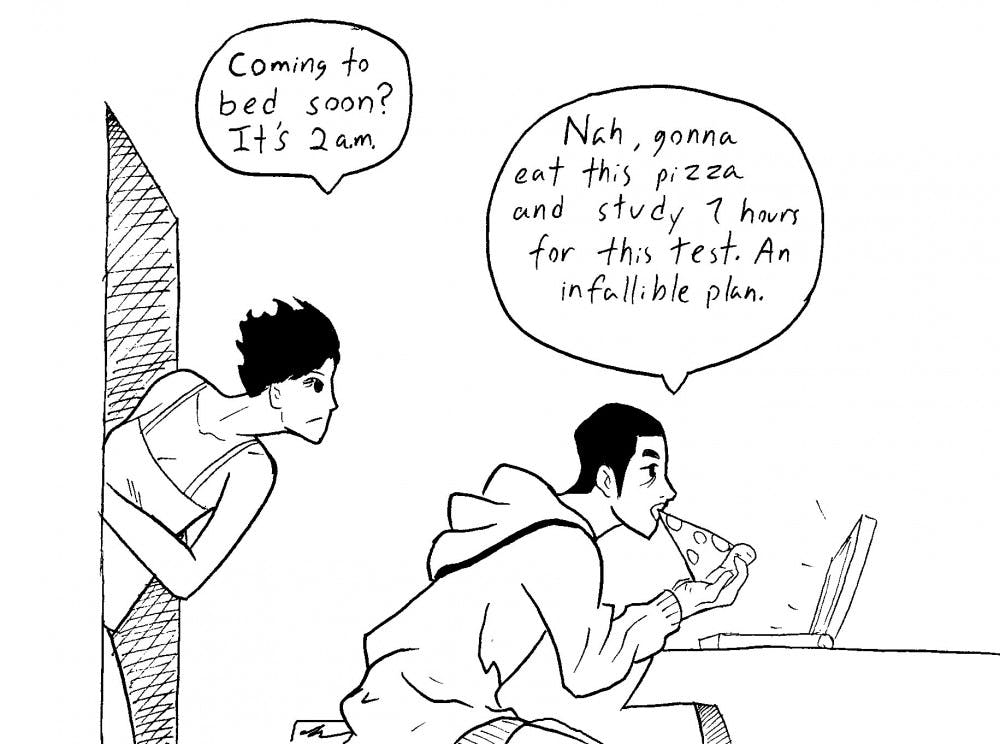As college students, we are used to sleepless nights as a result of looming exams, roommate drama or Netflix binges.
It’s getting to that point in the semester when some of us seem to be forced to chose: sleep, extra studying or being social?
When making up your mind, consider this: Lack of sleep carries a huge list of side effects. And your diet might impact you more than you think.
School
Sleep deprivation is linked to shortened attention span, decreased alertness, concentration, reasoning and problem-solving. That means pulling an all-nighter or staying up especially late many nights in a row might not guarantee you a 4.0 on your next exam.
Health
Lack of sleep can lead to dire health issues such as heart disease, heart attack and failure, irregular heartbeat, high blood pressure, stroke and diabetes. Loss of sleep also is linked to high rates of depression.
Sex
Sleep-deprived men and women have a serious decrease in sex drive. Nobody wants that.
Appearance
Puffy eyes, shallow skin, dark circles and fine lines are not what we want to see in the mirror, but they are highly correlated to logging low amounts of nightly Zs.
Weight
The common phrase “you snooze, you lose” does not apply to sleep loss and weight. Lack of sleep causes increased levels of the hormone Ghrelin (which stimulates hunger) and decreased leptin (which signals satiety, the feeling of fullness). Lack of sleep increased consumption of high fat and carbohydrate foods, both of which can play a huge role in weight gain.
Nutrition
As you can see, it is obvious that not getting enough sleep has a huge list of consequences. After I began to continually log fewer and fewer hours each night, I knew that I had to do something to get back on track and decrease my chances of developing these bad side effects. While part of it involved trying to get my homework done earlier and preparing to study earlier in the week, rather than just the night before, there was another big change many of us probably don’t consider.
So, what did I change?
I have one word for you: nutrition. A lot of people are surprised that what you put into your body actually impacts the quality and duration of your nightly snoozes.
Here are a few recommendations that will have you waking up each morning refreshed, recharged and ready to tackle the day.
Caffeine
This one is a no brainer. Aim to stop drinking caffeine 6 hours before you are planning to hit the hay.
Limit Fluids
We’ve all been there. You are in bed, ready to go to sleep and all of a sudden you realize you have to go to the bathroom. Worse yet? You wake up in the middle of the night one or more times to use the restroom.
Using the bathroom often throughout the night causes disrupts your sleep, which lowers the quality. Try to drink most of your fluids earlier in the day to avoid this.
Choose Food Wisely
Tryptophan, serotonin and melatonin are all substances that can help you sleep better. They can be found in high quantities in foods such as dairy, soy, seafood, meat and poultry, beans, whole grains, eggs and nuts or seeds. Notice how there no refined, fatty, high-sugar foods on that list? Those types of foods can seriously disrupt your rest. You can even buy melatonin pills at most local pharmacies if you’re struggling to add more of it into your diet naturally.
Alcohol And Tobacco
Alcohol is attributed to waking up frequently throughout the night, meaning that the hours you do log in the sack will be low quality. The nicotine in tobacco acts as a stimulant to keep you from falling asleep.
Try avoiding alcohol if you’re in need of a full night of sleep, or cutting back on drinking less frequently if you are regularly finding yourself sleep-deprived.
Colleen Kokx is a dietetics senior and member of the MSU Food and Nutrition Association. Reach her at kokxcoll@msu.edu.







